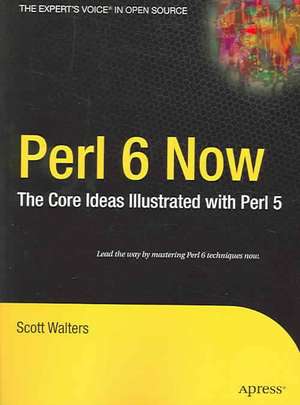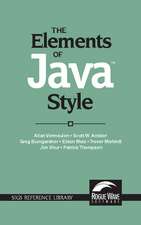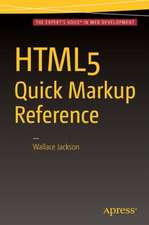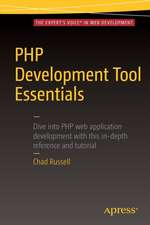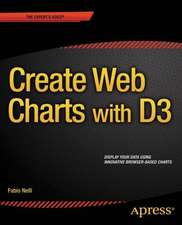Perl 6 Now: The Core Ideas Illustrated with Perl 5
Autor Scott Waltersen Limba Engleză Paperback – 15 dec 2004
* Most up-to-date text possible on the Perl language.
* Walters assists with bimonthly Phoenix Perl Mongers user group meetings, often presenting. Presentations include demonstrations of his CPAN modules, current topics in software engineering, object-oriented programming techniques, information security, peer to peer architecture, ecommerce with credit card gateways, and other topics.
Preț: 198.90 lei
Preț vechi: 248.63 lei
-20% Nou
Puncte Express: 298
Preț estimativ în valută:
38.07€ • 41.37$ • 32.00£
38.07€ • 41.37$ • 32.00£
Carte disponibilă
Livrare economică 31 martie-14 aprilie
Preluare comenzi: 021 569.72.76
Specificații
ISBN-13: 9781590593950
ISBN-10: 1590593952
Pagini: 388
Ilustrații: XXXIV, 424 p.
Dimensiuni: 178 x 235 x 21 mm
Greutate: 0.65 kg
Ediția:1st ed.
Editura: Apress
Colecția Apress
Locul publicării:Berkeley, CA, United States
ISBN-10: 1590593952
Pagini: 388
Ilustrații: XXXIV, 424 p.
Dimensiuni: 178 x 235 x 21 mm
Greutate: 0.65 kg
Ediția:1st ed.
Editura: Apress
Colecția Apress
Locul publicării:Berkeley, CA, United States
Public țintă
Popular/generalDescriere
Perl 6 Now: The Core Ideas Illustrated with Perl 5 is perfect for those eager to see where Perl is headed, Perl 5 programmers who want to know that their favorite tricks will still work in some form, and programmers wishing to open their minds to advanced programming topics.
Perl 6 generalizes the language, making it more extensible, eliminating longstanding pitfalls, and adding new concepts. Thanks to some clever people and impressive efforts, many of these new features work in Perl 5, so you can start using them now in production-level code.
The book teaches the basics from a Perl 6 perspective, touching on variable interpolation, datastructure use, object construction, threads, closures, symbol tables, and other core features. It then introduces continuations, coroutines, binding (or aliases), hyper operators that work on lists of data at once, set operators that work on complex datatypes, lightweight multidimensional arrays, strong type checking, autoboxing, precompilation, automatic module dependency installation, and more.
Though Perl 6 changes the fundamental syntax in some areas, Perl 5 code isn't left in the lurch. Thanks to PONIE, code from both versions may coexist in a single program. You’ll need to adjust only a few habits and learn a few new things, and this early adopters guide will help you do these things.
Perl 6 generalizes the language, making it more extensible, eliminating longstanding pitfalls, and adding new concepts. Thanks to some clever people and impressive efforts, many of these new features work in Perl 5, so you can start using them now in production-level code.
The book teaches the basics from a Perl 6 perspective, touching on variable interpolation, datastructure use, object construction, threads, closures, symbol tables, and other core features. It then introduces continuations, coroutines, binding (or aliases), hyper operators that work on lists of data at once, set operators that work on complex datatypes, lightweight multidimensional arrays, strong type checking, autoboxing, precompilation, automatic module dependency installation, and more.
Though Perl 6 changes the fundamental syntax in some areas, Perl 5 code isn't left in the lurch. Thanks to PONIE, code from both versions may coexist in a single program. You’ll need to adjust only a few habits and learn a few new things, and this early adopters guide will help you do these things.
Cuprins
- The Programmer's Introduction to the Perl Computer Programming Language
- Perl 6 Road Map
- Stricture by Default
- Text, Numbers, and Other Constant Data
- Names, Containers, and Values
- Operators
- Multidimensional Arrays
- Data Structures
- Switch
- Block Structure
- Subroutines
- CPAN Modules
- Objects
- Exceptions
- Type Safety
- Multithreading
- Any and All
- Lexical Closures
- Continuations
- Coroutines
Notă biografică
Scott Walters has been programming computers since 1984 (professionally since 1996). He built the corporate intranet at Mayo Clinic in Scottsdale, Arizona, and did pretty much everything for two startups. For fun, he runs http://perldesignpatterns.com, does CGI scripting for the NetBSD Project and http://projects.netbsd.org, maintains several CPAN modules, and helps coordinate Perl Mongers meetings for Phoenix Perl Mongers.
